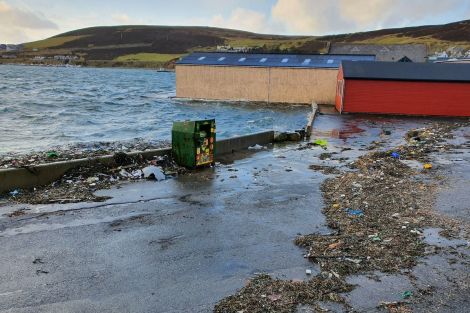Council / Council prepares for week of climate decisions
A WEEK after the isles saw some of the highest tides in decades, Shetland Islands Council (SIC) will consider a major report on tackling climate change – but it appears its officers have stopped short of declaring a climate emergency.
The report due to be presented to councillors on Tuesday and Wednesday outlines the steps the local authority will take to become greener, although at this stage the finer details have yet to be firmed up.
The report, by infrastructure director John Smith, outlines the direction of travel for the council when it comes environmental impact, and it calls for development of a climate change programme board.
The Scottish Government’s targets are for a 75 per cent reduction in carbon emissions in the same time frame and net-zero by 2045.
According to Smith, objectives in the report’s Climate Change – Strategic Outline Programme align closely with a petition from Shetland Climate Action containing over 500 signatures that will also be handed to councillors next week.
It calls on the SIC to join a host of other local authorities in the UK in declaring a climate emergency.
The council report adds that the consequences of climate change locally “will be highly significant across a wide spectrum of the Shetland environment, economy and society.”
The report makes no bones about the challenge facing the council in meeting such targets, but the current energy costs to the SIC and Shetland are huge.
The strategic outline programme points to the financial case for greening energy supply throughout the isles.
It states: “Overall Council energy consumption was estimated to be c 100gwh in 2018/19 [Gigawatt/hours]. Council energy costs are current in excess of £6.5m per annum, c£2.5 on electricity, c£4m on marine, vehicle and heating fuel.
“Whole Shetland energy consumption (excluding oil & gas terminals) was estimated to be c 1500gwh in 2008 ….. This would indicate an overall Shetland energy bill in the order of c£100m per annum.”
Become a supporter of Shetland News
It adds: “Maintenance and replacement costs for the buildings, vessels, vehicles and other assets associated with that energy use are in excess of £100m for the Council estate over the next five years, perhaps £1b for the whole of Shetland when replacement vehicles, house builds, vessels and other plant is taken into account.
“The costs of the interventions and actions required to respond to climate change effectively will require that spend to be restructured to alternative energy sources. The specific investments which will be required will be of a very significant scale.”
The financial implications include “very large investment required in new vehicles, boats, planes, alternative infrastructure by all parties, agencies, businesses and individuals.”
This will require large scale government and private sector investment with possible community participation.
The SIC, it says, cannot do everything alone, but must work in partnership with national government, industry and communities.
Environment and transport committee chairman Ryan Thomson previously said that declaring a statement of emergency “without any plan to tackle it would just be a meaningless political statement”, with an action plan with targets a more accountable way forward.
The report asks councillors to endorse a “proactive and collaborative approach” to climate change – and in particular working in partnership with other agencies.
It highlights a desire to undergo a “just transition” for carbon-heavy industries like the oil and gas industry, with a large number of jobs held locally in the energy sector.
The council already has a carbon management plan in place, and energy usage has been on the decrease over the last ten years.
However, expected energy consumption in 2020/21 of 91.42kWh is more than the target.
A key component of the council’s emissions is its fleet of diesel-guzzling ferries, with the ships contributing over half of the SIC’s CO2 output.
Diesel is also estimated to account for 80 per cent of Shetland’s carbon emissions.
Smith, however, says in his report that “replacement with greener vessels is dependent on actions that can only be taken forward after full ferry funding agreement with the Scottish Government.”
Become a supporter of Shetland News
Shetland News is asking its many readers to consider start paying for their dose of the latest local news delivered straight to their PC, tablet or mobile phone.
Journalism comes at a price and because that price is not being paid in today’s rapidly changing media world, most publishers - national and local - struggle financially despite very healthy audience figures.
Most online publishers have started charging for access to their websites, others have chosen a different route. Shetland News currently has over 600 supporters who are all making small voluntary financial contributions. All funds go towards covering our cost and improving the service further.
Your contribution will ensure Shetland News can: -
- Bring you the headlines as they happen;
- Stay editorially independent;
- Give a voice to the community;
- Grow site traffic further;
- Research and publish more in-depth news, including more Shetland Lives features.
If you appreciate what we do and feel strongly about impartial local journalism, then please become a supporter of Shetland News by either making a single payment or monthly subscription.
Support us from as little as £3 per month – it only takes a minute to sign up. Thank you.
























